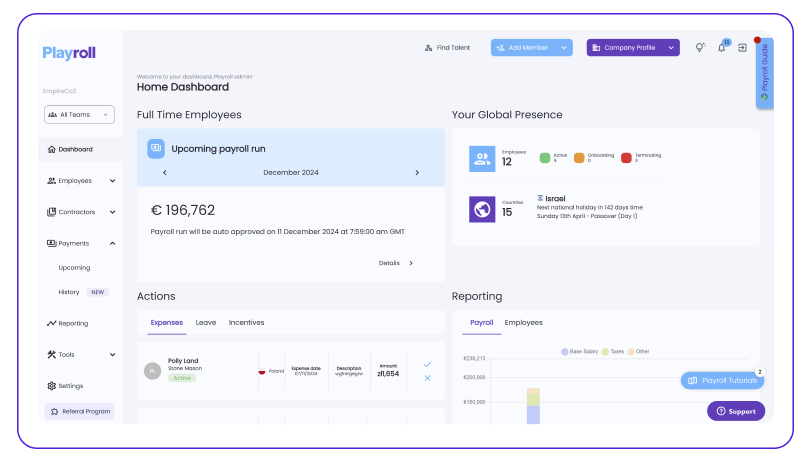Copied to Clipboard
Ready to get Started?

.jpg)
Key Takeaways
HR support is something many small businesses overlook – until it becomes a must-have. As your team grows, whether locally or internationally, solid HR practices become key to staying compliant, keeping employees happy, and driving growth. But as your business scales, managing payroll, labor laws, and onboarding can quickly become a lot to handle.
Full-time HR managers can be expensive, averaging $15,000–$260,000 annually in the U.S, and relying on manual tools like spreadsheets can create risks. That’s where HR software for small businesses and outsourcing to an Employer of Record come in. They offer a smarter, more affordable way to handle HR. In this guide, we'll deep-dive into how you can streamline your HR processes, reduce costs, and help your small business thrive while maintaining compliance.
Why Do Small Businesses Need HR?
No matter the size of your business, HR plays a crucial role in managing your team, staying compliant, and creating a sustainable workplace. Whether you're a startup with fewer than 50 employees or a growing company with 50 to 250, HR software makes handling key tasks much simpler. It streamlines processes like payroll, onboarding, training, and benefits, so your leaders can focus on growth. Plus, as your business grows, HR software can grow with you, tackling challenges like administrative overload, legal risks, and boosting employee satisfaction along the way.
By keeping you compliant with local and international labor laws, automating payroll and recruitment through social media and job postings, and creating consistent employee handbooks, HR software helps your business run more smoothly and securely. The benefits are significant: it can lower costs (from just $399 per employee monthly versus $15,000–$260,000 for a full-time HR manager), support global expansion, and improve employee satisfaction through streamlined processes and competitive benefits.
For small business owners managing flexible work arrangements or employees in different countries, HR platforms handle the heavy lifting of complex HR functions. This helps build a strong foundation for attracting talent, staying compliant, and setting your business up for long-term success.
8 Key Functions of HR for Small Businesses
Running a small business is a balancing act. Whether you’re a tiny startup or just expanding across borders, here’s how these HR functions keep your team happy and your business on track:
1. Monitoring Compliance and Risk Mitigation
Each country you operate in has its own unique labor and tax laws that can change frequently. This means staying updated on tax laws, employee rights, and safety regulations to avoid costly penalties. For small business owners, it can feel overwhelming to stay compliant, especially with teams in different countries. This is where human resources steps in, to make sure your business stays on the right path by keeping up with local and global rules, like minimum wage laws or data protection in Europe.
A global HR platform like Playroll monitors compliance in real-time to keep you continuously updated, no matter where you are hiring globally.
2. Managing Payroll Reporting
There's nothing quite as important as paying your employees on time and correctly. HR keeps your payroll system runs smoothly across borders. They handle everything from salaries to taxes and deductions and reporting, so you can focus on growing your business without worrying about payroll errors.
That said, calculating salaries, taxes, and work hours manually is time-consuming and prone to mistakes. According to Zapier, automating payroll and HR tasks can cut processing time by up to 75% and reduce payroll errors by reducing manual data entry. HR software makes this easy by automating payments, even for global teams paid in different currencies.
Playroll’s HR solutions makes sure everyone gets paid correctly and on time, with minimal manual intervention.
3. Overseeing Hiring and Onboarding
Hiring and onboarding are the key first steps in getting new employees settled into the company, and HR teams are at the heart of making it all happen smoothly. It starts with getting the word out – HR manages job postings across social media, job boards, and the company’s website, making sure they attract a diverse group of talented candidates.
Once the right person is hired, HR helps them get acclimated, guiding them through their first days with the resources they need, introducing them to the company culture, and ensuring they’re set up for success.
4. Managing Employee Benefits
Providing employee benefits is a great way to show your team you value them and keep them on board for the long term. But handling benefits like health insurance, paid leave, and retirement plans gets complex, especially when you’re managing teams across different regions. That’s where HR steps in, making sure everything’s streamlined from start to finish. They work with insurance providers to pick the best plans, guide employees through the process, and ensure compliance with laws like the Affordable Care Act (ACA).
HR also handles leave benefits, keeping track of vacation, sick days, and parental leave. They ensure everyone knows what they’re entitled to and how to request time off without issue.
5. Streamlining Recruitment and Talent Acquisition
To attract top talent in today’s competitive job market, you need the right tools and the right people to find the right fit. HR in small businesses simplifies this process by managing job postings on platforms like LinkedIn and local job boards, while carefully sorting through applications to pinpoint the best-fit candidates. With the help of smart recruitment tools, HR helps you find and hire the right talent, whether they’re down the street or across the globe. This approach not only saves valuable time but also ensures that new hires are a perfect match for your company’s vision.
Imagine a small fashion brand in Mumbai with 12 employees, struggling with manual resume reviews for a marketing role. By using an applicant tracking system (ATS) within HR software for small businesses, they posted job postings on social media, sorted 50 applications by keywords, and hired a top candidate from Singapore in 10 days, saving 15 hours. This example shows us the power of HR and how the right set of tools helps small business leaders in the hiring process.
6. Enhancing Employee Training and Development
Human resources makes onboarding and training easy by offering online courses and tracking progress, boosting employee satisfaction and performance in turn. This is essential because most small businesses can’t afford to hire extra hands, so training your current team to handle bigger challenges is a non-negotiable. Skipping training is a mistake you can’t afford: 90% of HR managers say training boosts productivity, and 86% say it improves retention. Without it, you risk skill gaps and turnover, which can cost $4,000 to replace each employee.
💡 Pro Tip: Use an HR software with learning management systems (LMS) to deliver personalized training to each employee. Set clear goals, like mastering a new tool in 30 days, and check in monthly to keep your team engaged and competitive.
7. Process Optimization
If you’re overwhelmed by paperwork or manual scheduling, you’re wasting time you don’t have. Small businesses often rely on outdated methods like paper forms, which are generally slow, error-prone, and aren't scalable. If you’re a leader in a small business, inefficient HR processes can hold you back. Human resource management uses analytics to spot potential bottlenecks and improve processes to help you save time, reduce errors, and let you focus on growth instead of admin work.
Pro Tip: Adopt an HR software with analytics to automate tasks like scheduling or compliance checks. The key is to start small – first try automating employee time-off requests to ensure fair hours and compliance with local labor laws. This is a sure-fire way to keep your team happy and your operations efficient. In fact, businesses using automated strategic payroll systems report 70% fewer compliance issues.
8. Cost Saving and Efficiency
Running a small business means every penny counts. HR software is your key to save money without cutting corners. Automating tasks like payroll, compliance, and benefits management drastically cuts errors and costs compared to hiring a full-time HR manager.
Outsourcing HR to an Employer of Record or implementing robotics process automation (RPA) can save 20-40% compared to in-house HR. Start by implementing one automated task, like payroll or tax filings, to see savings in the short term.
Challenges of Hiring an In-House HR Manager
As a small business owner, you’re likely focused on running things efficiently, and hiring an in-house HR manager might seem like a good way to handle your HR needs. But the reality doesn’t always match the expectation. Bringing on a full-time HR professional can be expensive and may not fit your needs as well as anticipated. Here's why hiring an in-house HR manager might not be the best option for small businesses:
- High Costs: An in-house HR manager typically earns between $76,000 and $120,000 per year. For small businesses, this can quickly strain the budget. Instead, using HR software can reduce costs related to payroll and compliance, freeing up money for other areas like product development and business growth.
- Limited Workload: Most small businesses don’t require a full-time HR manager because their HR needs, like managing payroll or benefits, are limited. Many tasks, such as onboarding or training, don’t require 40 hours a week. HR software or outsourcing can handle these tasks more effectively, scaling with your business while keeping costs low.
- Hiring Difficulties: Finding a qualified HR professional for a small company isn’t easy – professionals often prefer larger firms due to more career growth opportunities. This leaves you with a lengthy search or less experienced candidates, putting you at risk of errors in compliance or payroll that could cost you.
- Opportunity Cost: Spending on an HR manager means less money available for other growth initiatives, like marketing, new hires, or offering flexible work options. By shifting focus to more scalable solutions, you can direct those resources into areas that drive business expansion.
Alternatives to Manage HR Affordably
You don’t need an expensive in-house HR manager to run an efficient HR function. There are more affordable options that get the job done. Outsourcing, software, and part-time experts can streamline your HR, save you time and money, and keep your team happy and compliant.
HR Outsourcing (PEO/EOR)
Instead of hiring an in-house HR manager, many small businesses turn to Professional Employer Organizations (PEOs) as co-employers or an Employers of Record to handle global HR. These third parties handle complex HR tasks like payroll, benefits management, and compliance with local labor laws, saving you from costly missteps.
Outsourcing the HR function can reduce HR costs by 20-40% compared to using in-house staff, and it ensures compliance with local regulations.
HR Software and Tools
Many small businesses delegate HR tasks to existing staff and use cloud-based HR software to automate work like payroll, onboarding and training, and work hours tracking. Automation saves time (reducing administrative workload by 10-50%), reduces payroll errors by 40-75%, and scales affordably with your business.
Here’s a rundown of key tools to look into:
- Payroll Apps: Automate salary calculations, tax filings, and direct deposits to save time and avoid errors.
- Benefits Platforms: Streamline benefits management with tools that let employees manage health plans or retirement contributions themselves.
- Independent Contractor Management software: Offers compliant onboarding, payment in contractors’ local currencies, and a unified dashboard to manage global contractors all on one platform.
Fractional HR or Consultants
Small firms sometimes engage part-time HR consultants or fractional HR managers who work on demand, filling expertise gaps without committing to a full-time salary. This allows you to hire expert help exactly when and where you need it. Fractional HR can cost 50-70% less than a full-time HR manager, making it ideal for small businesses with infrequent and sporadic HR needs.
This is a suitable option for small businesses looking for HR support at a lower price point, with industry-specific experience and clear deliverables.
Grow Your Business with Ease, Anywhere

As your business grows, HR tasks can become a drain on your time and resources. Outsourcing to a reliable EOR provider helps you save time, reduce costs, and stay compliant with global employment laws.
Playroll’s HR software streamlines the entire process of scaling across borders, offering global payroll solutions and EOR expertise to help you build a compliant team wherever you operate. Book a chat with our team to get started.
HR in Small Businesses FAQs
Do small businesses really need HR?

.png)
Yes, small businesses do need HR to manage essential tasks like payroll, compliance, recruitment, and employee satisfaction. However, a full-time HR hire may not be necessary for every small business. Instead, many small businesses can rely on HR software to automate processes like payroll and compliance, or they can outsource HR functions to professional services or consultants.do need HR to manage tasks like payroll, compliance, and employee satisfaction, but they can often rely on HR software or outsourcing instead of a full-time hire.
When should a small business hire an HR manager?

.png)
A small business should consider hiring an HR manager when it grows beyond 50 employees or faces complex HR challenges, like global hiring, that software or outsourcing can’t fully address. Until then, tools like Playroll or part-time consultants are more cost-effective.
What are the best HR tools for small businesses?

.png)
The best HR tools for small businesses are cloud-based software solutions that streamline tasks like payroll, benefits management, and employee onboarding. Tools like Playroll are excellent for automating payroll and ensuring compliance globally. Other popular tools for small businesses include Zenefits, BambooHR, Justworks and Deputy.
What HR responsibilities do small business owners need to manage?

.png)
Small business owners must manage payroll, compliance with local labor laws, job postings, work hours tracking, and employee satisfaction to stay competitive and compliant. Using HR software for small businesses or outsourcing can simplify these tasks effectively for small business owners.
.svg)
.svg)
.svg)

.svg)
.svg)




.png)


.svg)


.png)












.svg)